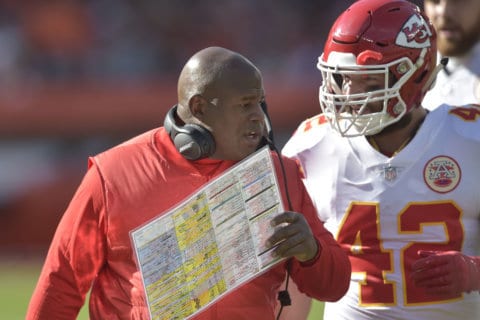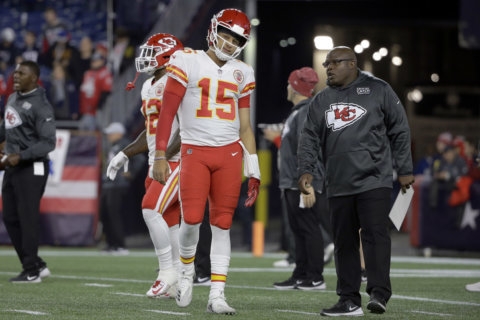Last week in Atlanta, Morehouse College was the scene of an unprecedented gathering of minority football coaches and executives — a gathering that absolutely shouldn’t be necessary in 2019.
These coaches, which included Maryland head coach Mike Locksley and Pep Hamilton, the head coach of Washington’s yet-to-be-named XFL franchise, were brought together by the NFL Football Operations department and the Black College Football Hall of Fame to empower and educate coaches at the pro and collegiate level, and tear down the age-old belief that there simply aren’t enough qualified black head coaching candidates.
Leaving the inaugural Quarterback Coaching Summit. If you hear anyone repeat the erroneous mantra that the NFL head-coaching pipeline lacks minorities at the offensive coordinator and QB coach spots, just 😂 and turn away. They have no idea what they’re talking about.
— Jim Trotter (@JimTrotter_NFL) June 25, 2019
Jim Trotter of NFL Media covered the inaugural Quarterback Coaching Summit, which he told WTOP had a positive tone overall but that “there’s no question there’s an undercurrent of frustration among the coaches.”
College football’s yearslong diversity problem is well documented, and the NFL has rightfully drawn increased criticism for its dramatic drop in minority head coaches. If eight out of 32 wasn’t good enough in 2018, just imagine the frustration of that number being chopped in half after the latest coaching cycle. The only minority hire of 2019 (Brian Flores in Miami) just happened to be hired by the NFL’s only black GM (Chris Grier).
At a time when everyone wrongheadedly wants the next Sean McVay, the NFL has only two black offensive coordinators and four quarterback coaches of color. One of those coordinators, Eric Bieniemy, helped lead an already-potent Chiefs offense to the next level and still didn’t get a head coaching job.
Apparently working with a hot QB isn’t foolproof either. Locksley’s work with Heismann Trophy finalist Tua Tagovailoa didn’t elevate him to the pros and Hamilton not only helped Andrew Luck become the first overall pick in 2012, but was his offensive coordinator in Indianapolis during Luck’s best pro season (2014).
This is unacceptable. Even though Ozzie Newsome, the NFL’s first black GM, was also ignorant of the amount of the available minority coaching talent, Trotter pointed out we need only look at the latest College Football Playoff National Championship between Alabama and Clemson.
“If it’s true that NFL clubs are looking for offensive coaches — particularly at the quarterback position, coordinator position — and in the last national championship game, both offensive coordinators were people of color (Locksley and Clemson’s Tony Elliott) — neither one of those men even got one interview for an NFL job,” Trotter said.
So it begs the question: If they were white and coaching in the national championship game, would that still be the case?
“You just have to wonder, you have to question,” said Trotter.
The most egregious example of this imbalance is in Arizona, where the Cardinals quickly dumped Steve Wilks after one season in favor of Kliff Kingsbury, who has never coached in the pros and had a losing college record despite having QBs like Baker Mayfield and Pat Mahomes — a fact that led NFL executive president of football operations Troy Vincent to say at the two-day summit: “We can sell a nonwinning white coach, but we struggle to sell a winning black coach.”
Of course, Vincent’s quote doesn’t reference Wilks’ lone 3-13 season, but rather the baffling unemployment of former Lions and Colts coach Jim Caldwell despite an impressive resume and incredible attention to detail — a sentiment Trotter shares.
“The idea that Jim Caldwell is not a head coach in the NFL — he had three winning seasons in four years in Detroit, he went 9-7 his last two years, he went to the playoffs, he’s been to a Super Bowl with the Colts — for him to not be a head coach in the NFL is criminal,” Trotter said.
Trotter said the purpose of this summit was not for coaches to bemoan their situation, but to “remove any potential talking points as to why [they’re] not head coaches.”
“That was empowering,” Trotter said. “It would have been very easy to be angry, almost even bitter, because the argument there aren’t enough [qualified minority coaches] is not true. But you have to be willing to find them, you have to be committed to understanding the importance of diversity and what it brings.”
Unfortunately, the NFL made a clear statement about how much it prioritizes diversity. Not one owner showed up to the summit and the only white GM in attendance was Minnesota’s Rick Spielman, who Trotter pointed out has adopted six black sons and seeks to fill his two offensive quality control positions with minorities. Former Ohio State coach Urban Meyer, who had multiple minority assistants ascend to college head coaching positions, was the only white coach there.
“If you truly want to address this problem, you have to make it important, you have to make it a priority, and you have to commit to that. And unfortunately, we did not see that at this symposium,” Trotter said.
Trotter summed up the coaches’ collective attitude like this: “Let’s network, let’s educate each other, let’s empower each other — let’s do everything that we can do so [the lack of opportunities] can’t be put on us.”
Your move, NFL. These coaches have announced their presence — something that’s been denied for far too long. Now it’s up to owners and GMs to not only recognize worthy candidates like Locksley, Elliott, Hamilton, David Shaw, James Franklin and Dino Babers, but give them a real opportunity to demonstrate they deserve the label “offensive genius” every bit as much as their white counterparts.







